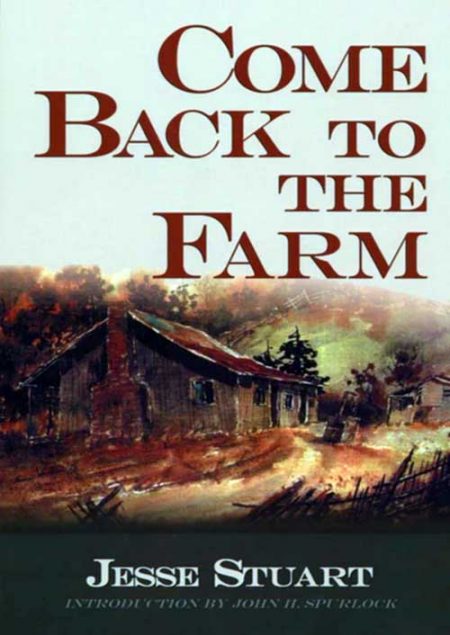-
Out of stock
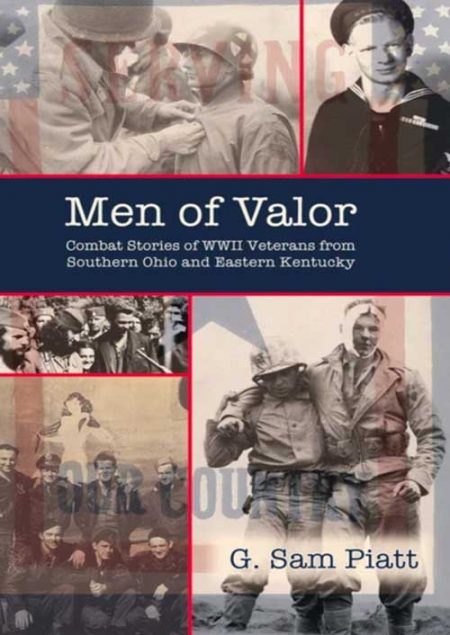 Within the pages of this book, more than sixty-five local combat veterans of World War II share their experiences. There are stories of life in the foxholes, on the beaches, having ships torpedoed out from under them on the deep oceans, and bailing out of burning bombers behind enemy lines. Soldiers and sailors and airmen saw their young friends die beside them but found no time for mourning. They spent sleepless nights with artillery shells exploding all around. They were scared and homesick. Sam Piatt, calling on his thirty years of experience as an award-winning daily newspaper reporter, relates these stories so poignantly that at times it seems the reader can actually hear and feel the battle as they are described. Men of Valor is a book that will keep the reader riveted to the combat stories of World War II veterans from Ohio and Kentucky. SOFTBACK By Sam Piatt
Within the pages of this book, more than sixty-five local combat veterans of World War II share their experiences. There are stories of life in the foxholes, on the beaches, having ships torpedoed out from under them on the deep oceans, and bailing out of burning bombers behind enemy lines. Soldiers and sailors and airmen saw their young friends die beside them but found no time for mourning. They spent sleepless nights with artillery shells exploding all around. They were scared and homesick. Sam Piatt, calling on his thirty years of experience as an award-winning daily newspaper reporter, relates these stories so poignantly that at times it seems the reader can actually hear and feel the battle as they are described. Men of Valor is a book that will keep the reader riveted to the combat stories of World War II veterans from Ohio and Kentucky. SOFTBACK By Sam Piatt -
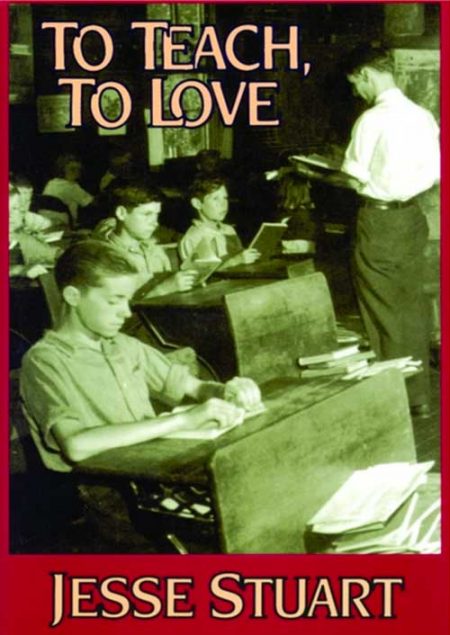 Stuart's autobiographical account of much of his educational career. This great Kentucky novelist, short story writer, poet, and teacher writes about his boyhood, his elementary school and high school experiences, and his days at Lincoln Memorial University. He tells of teaching in a one room rural schoolhouse, his experiences as a county school superintendent, and his stay as a teacher at American University in Cairo, Egypt. He explains what classroom methods worked best, and why, and speculates on what has gone wrong with American schools. By Jesse Stuart
Stuart's autobiographical account of much of his educational career. This great Kentucky novelist, short story writer, poet, and teacher writes about his boyhood, his elementary school and high school experiences, and his days at Lincoln Memorial University. He tells of teaching in a one room rural schoolhouse, his experiences as a county school superintendent, and his stay as a teacher at American University in Cairo, Egypt. He explains what classroom methods worked best, and why, and speculates on what has gone wrong with American schools. By Jesse Stuart -
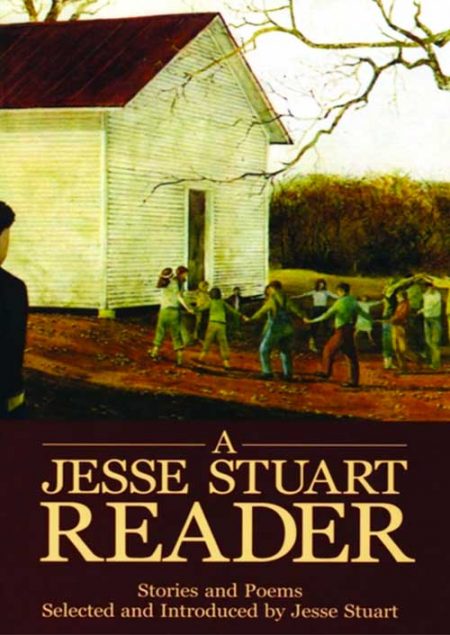 Junior High and High School teachers who wish to introduce their students to Jesse Stuart have a unique teaching tool available in A Jesse Stuart Reader. This 352-page book was designed as a classroom text, and consists of eighteen stories, twenty-six poems, and excerpts from three autobiographical books — God’s Oddling, The Thread That Runs So True, and The Year of My Rebirth. An additional study and teaching aid is Ella DeMer’s 31-page “Commentary and Study Questions” section at the end of the book. Schools ordering 30 or more copies may purchase the book at $9 per copy, a 40% discount. Although most classroom sets are purchased for grades 7-12, this book is effective at the collegiate level, too. Please contact the JSF directly to take advantage of bulk discounts. SOFTBACK By Jesse Stuart
Junior High and High School teachers who wish to introduce their students to Jesse Stuart have a unique teaching tool available in A Jesse Stuart Reader. This 352-page book was designed as a classroom text, and consists of eighteen stories, twenty-six poems, and excerpts from three autobiographical books — God’s Oddling, The Thread That Runs So True, and The Year of My Rebirth. An additional study and teaching aid is Ella DeMer’s 31-page “Commentary and Study Questions” section at the end of the book. Schools ordering 30 or more copies may purchase the book at $9 per copy, a 40% discount. Although most classroom sets are purchased for grades 7-12, this book is effective at the collegiate level, too. Please contact the JSF directly to take advantage of bulk discounts. SOFTBACK By Jesse Stuart -
 The book is more than just a dog story – with celebration of America’s melting pot democracy as a significant theme, it’s full of sparkling social satire, native lore, and mountain magic. A dog of many masters and mistresses, Jerry-B Boneyard is first befriended by Glenna Powderjay. When she goes away to college, he feels he’s not wanted and clears out to make a name for himself. Then follows a series of delightful adventures as Jerry-B tries to find his place in the world. He runs wild with a family of foxes, enjoys a romance with a pretty vixen, and even falls into temporary disgrace as a drunkard while a watchdog at a still. Mongrel Mettle is made-to-order for dog lovers everywhere. Taking in a much wider field than the usual Jesse Stuart book, it still retains the familiar charm for all who know and enjoy his work. This 80th anniversary edition of Mongrel Mettle: The Autobiography of a Dog by Jesse Stuart is made possible by generous support from Donna and Richard Sanders who dedicate the book to their grandchildren. This softback edition has 201 pages and features illustrations by Woodi Ishmael. SOFTBACK VERSION By Jesse Stuart
The book is more than just a dog story – with celebration of America’s melting pot democracy as a significant theme, it’s full of sparkling social satire, native lore, and mountain magic. A dog of many masters and mistresses, Jerry-B Boneyard is first befriended by Glenna Powderjay. When she goes away to college, he feels he’s not wanted and clears out to make a name for himself. Then follows a series of delightful adventures as Jerry-B tries to find his place in the world. He runs wild with a family of foxes, enjoys a romance with a pretty vixen, and even falls into temporary disgrace as a drunkard while a watchdog at a still. Mongrel Mettle is made-to-order for dog lovers everywhere. Taking in a much wider field than the usual Jesse Stuart book, it still retains the familiar charm for all who know and enjoy his work. This 80th anniversary edition of Mongrel Mettle: The Autobiography of a Dog by Jesse Stuart is made possible by generous support from Donna and Richard Sanders who dedicate the book to their grandchildren. This softback edition has 201 pages and features illustrations by Woodi Ishmael. SOFTBACK VERSION By Jesse Stuart -
 When the Japanese attacked Pearl Harbor in December 1941, Cornelia Fort was already in the air. At twenty-two, Fort had escaped Nashville’s debutante scene for a fresh start as a flight instructor in Hawaii. She and her student were in the middle of their lesson when the bombs began to fall, and they barely made it back to ground that morning. Still, when the U.S. Army Air Forces put out a call for women pilots to aid the war effort, Fort was one of the first to respond. She became one of just over 1,100 women from across the nation to make it through the Army’s rigorous selection process and earn her silver wings. SOFTBACK VERSION By Katherine Sharp Landeck
When the Japanese attacked Pearl Harbor in December 1941, Cornelia Fort was already in the air. At twenty-two, Fort had escaped Nashville’s debutante scene for a fresh start as a flight instructor in Hawaii. She and her student were in the middle of their lesson when the bombs began to fall, and they barely made it back to ground that morning. Still, when the U.S. Army Air Forces put out a call for women pilots to aid the war effort, Fort was one of the first to respond. She became one of just over 1,100 women from across the nation to make it through the Army’s rigorous selection process and earn her silver wings. SOFTBACK VERSION By Katherine Sharp Landeck -
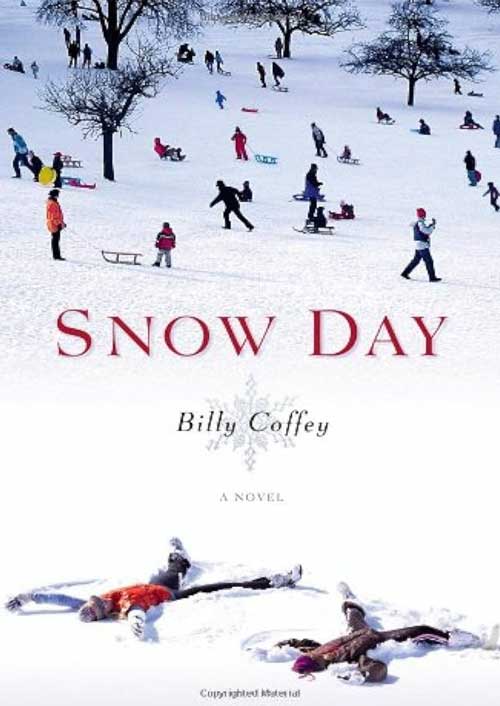 Awakened by radio broadcasts urging the residents of a small Virginia town to take a snow day rather than travel to school and work, Peter Boyd finds himself with both an unexpected day off and an opportunity to find big truths in small moments and surprise encounters. Peter believes he has a good life, with a decent job and a family he loves. But he’s quietly worried he’ll be cut when downsizing takes effect at the factory, his family will lose the home they love, and his faith will crumble along with his bank account. Through the course of one day, Peter finds himself revisiting his past through old friends, finding out there is a Santa Claus - though he drives a truck instead of a sleigh - and rediscovering that whatever comes in life, hope is the only choice that makes sense. Debut novelist Billy Coffey offers a heartwarming and beautiful story about the faithful way God speaks, even when we won’t listen. Like Peter, you’ll reaffirm that faith is worth having and your worst fears are no match for an astounding, loving God. HARDBACK VERSION By Billy Coffey
Awakened by radio broadcasts urging the residents of a small Virginia town to take a snow day rather than travel to school and work, Peter Boyd finds himself with both an unexpected day off and an opportunity to find big truths in small moments and surprise encounters. Peter believes he has a good life, with a decent job and a family he loves. But he’s quietly worried he’ll be cut when downsizing takes effect at the factory, his family will lose the home they love, and his faith will crumble along with his bank account. Through the course of one day, Peter finds himself revisiting his past through old friends, finding out there is a Santa Claus - though he drives a truck instead of a sleigh - and rediscovering that whatever comes in life, hope is the only choice that makes sense. Debut novelist Billy Coffey offers a heartwarming and beautiful story about the faithful way God speaks, even when we won’t listen. Like Peter, you’ll reaffirm that faith is worth having and your worst fears are no match for an astounding, loving God. HARDBACK VERSION By Billy Coffey -
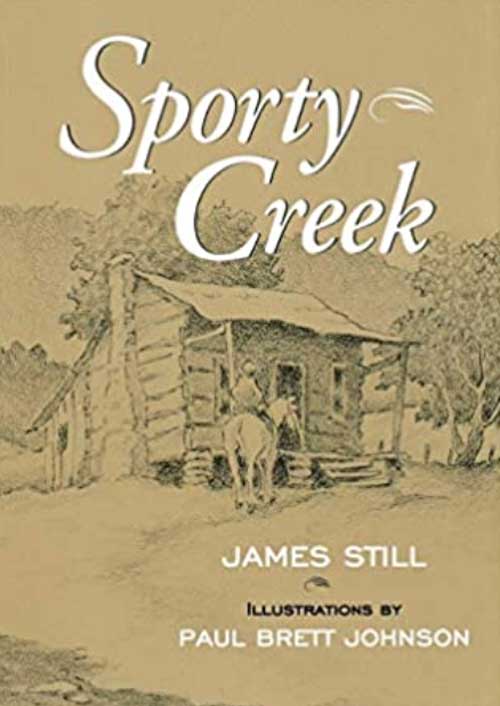 Sporty Creek is a series of short stories set in the Kentucky hills. Narrated by a young boy (a cousin of the narrator of Still's classic novel River of Earth), the book tells the story of his family during the Great Depression. With work in the coal mines sporadic, they move from place to place, trying to earn a living the best they can. The story is told with gentleness and humor. SOFTBACK VERSION By James Still
Sporty Creek is a series of short stories set in the Kentucky hills. Narrated by a young boy (a cousin of the narrator of Still's classic novel River of Earth), the book tells the story of his family during the Great Depression. With work in the coal mines sporadic, they move from place to place, trying to earn a living the best they can. The story is told with gentleness and humor. SOFTBACK VERSION By James Still -
 “Wit, Wisdom and Other Stuff” is a compilation of 125 commentaries. He is a former reporter for The Associated Press and for newspapers in Ironton, Ohio, Ashland, Ky. and Huntington, W.Va. Keith Kappes is a retired university vice president who returned to community journalism to be publisher of the Morehead News Group for six years. Two years before this book project, he wrote and published “The View from my Keyboard." SOFTBACK VERSION By Keith Kappes
“Wit, Wisdom and Other Stuff” is a compilation of 125 commentaries. He is a former reporter for The Associated Press and for newspapers in Ironton, Ohio, Ashland, Ky. and Huntington, W.Va. Keith Kappes is a retired university vice president who returned to community journalism to be publisher of the Morehead News Group for six years. Two years before this book project, he wrote and published “The View from my Keyboard." SOFTBACK VERSION By Keith Kappes -
Sale!
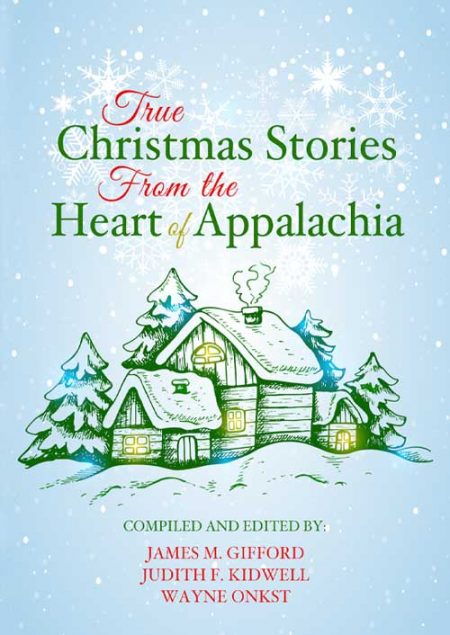 This book captures the spirit of Christmas in 43 true stories by 39 authors. Thirty-five of the stories are set in Kentucky and the others are from neighboring states. All of these powerful and well-written stories emanate from the heart of Appalachia, and many attach themselves to your heart. This is a great Christmas gift book! SOFTBACK VERSION FULL COLOR INTERIOR (You will receive 5 copies of this book for the price of 4)
This book captures the spirit of Christmas in 43 true stories by 39 authors. Thirty-five of the stories are set in Kentucky and the others are from neighboring states. All of these powerful and well-written stories emanate from the heart of Appalachia, and many attach themselves to your heart. This is a great Christmas gift book! SOFTBACK VERSION FULL COLOR INTERIOR (You will receive 5 copies of this book for the price of 4)



